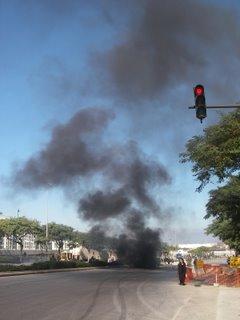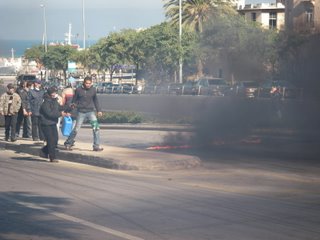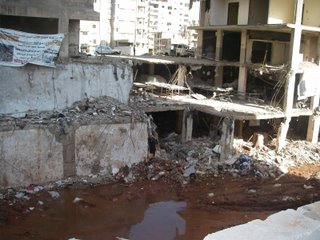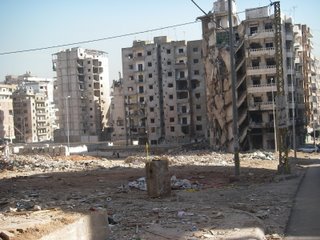Yesterday, Tuesday, is a day I wish I could quickly forget.
Blessed with a journalist's working hours, my alarm was still an hour from sounding when I rolled out of bed at nine in the morning. Opening my computer to see that I had no new email and that there was no new news coming out of Lebanon, I crawled back into bed for some more shut eye.
When I got out of bed an hour later, I flicked on CNN, a common trick for helping me come to my senses. I turned it on just in time to see the broadcast's opening segmet. "Twin blasts kill a dozen north of Beirut," the caption at the bottom of the page read. Startled, I hustled through showering and getting dressed before running out the door. As I walked down the street, it seemed just perfect to me that a day like this would be cold and rainy. It wasn't that the rain was that hard, it was that the cloud cover was so thick that the city was eerily dark.
When I bustled into work minutes later, I conferred with the other journalists to get the news. In the middle of my questioning, two other reporters brushed by me towards the door. One of them was in tears because her family was from the mountain town where the bombing had occurred. Hardly saying a word, I grabbed my camera and rushed after them. We were soaked by the time we reached our car just a block away.
What was so terrible about this bombing, we all agreed in the car, was that this was really the first time since the civil war ended that terrorists had targeted civilians at random. Unlike many other terror-prone Middle Eastern countries, terrorism in Lebanon targets important politicians and journalists almost exclusively.
Our route took us about twenty minutes straight up the coastal highway. The clouds kept us from seeing much of the sea. We then made an abrupt turn off the highway and started up the tiny mountain road that would take us to our destination. Small town piled upon small town all rolled out in front of us as we tackled a seemingly endless set of switchbacks that traversed the steep mountainside. Watching the clouds wind their way through the mountains, I could not help but feel some sort of dread for having tagged along.
At last, we saw a poncho-wearing policeman up ahead on the road, diverting all cars off to the left. We drove up to him and showed our press credentials and he immediately, and almost apologetically, waved us through. We drove another fifty yards up the road and parked. As we headed up the rest of the way on foot, we began to see an assembled crowd ahead. There were too many cars, journalists, and policemen to make immediate sense of my surroundings.
As I approached, however, it all laid itself out for me in nightmarish reality. I think what initially surprised me most was, ironically, my momentary lack of shock. For a moment it seemed to me as though I had seen something like this a hundred times before. Then I realized that it was television and movies that were paving that lie, and at that moment I flinched in the understanding that this was the first real act of terrorism I had laid eyes on.
The first bus was only about twenty feet behind the police barricade. I was facing the bus head-on and the damage done to it was frightening. The windows were all either blown out or broken into shards. The back of the bus, where the bomb had been planted, was squeezed like an accordion. I was fortunate that, having arrived exactly three hours after the bombing, all the victims had been taken to hospitals and all blood had been washed away by the rain.
I turned to my left and saw the CNN reporter who had first brought the gruesome images straight from the rainy mountains into my apartment. In front of me was a barrage of policemen and several bomb sniffing dogs. Soaked to the bone with their backs to the buses, the policemen looked something between scared and helpless.
Dignitaries streamed to the site. Members of Parliament, flanked by body guards and led by aides with umbrellas, would duck under the police line and walk right up to the buses, head bowed as they prayed for a moment or two before being hustled back to their cars by concerned guards.
The second bus, about thirty meters behind the first, was even more chilling. Its roof and walls were entirely ripped off. Where they had landed, I have no idea. Soaked and burned, the brownish-orange seats sat in a mangled mess. Devistatingly, local store-keeps told us, the bomb in the second bus went off between five to ten minutes after the first one. By the time the second one went off, people had swarmed the first bus, trying to help the injured. After the second explosion, locals were too afraid to approach the buses and help people for fear of further bombs. This was truly the classic definition of terrorism.
Standing where I was, twenty feet from the first bus, I looked out left of the road into a steep drop-off between mountains. On the right side of the road was a tall wall that had been erected when the road was carved out of the mountain. The distance between the wall and the drop off must have been fifteen yards. As I stood there taking in the scene, the most devastating thing happened. A group of about a dozen ten year-old students came walking up from behind. Ushered by several teachers, they were on their way home after school had been cancelled early. Because of the limited number of roads on the mountain, the kids were forced to walk down this one.
When they arrived at the police barricade, one of the teachers conferred with the head policeman and explained the issue. The policeman looked reluctant since almost nobody, barring dignitaries, were gaining access to the site itself. But he relented. As the students, short enough to not have to duck under the police tape, started heading down the road, their teachers called to them urgently and repeatedly to face the wall. "Look at the wall," they yelled. "Don't look over here." But as ten year olds tend to, several of them stole looks at the buses which lay no more than fifteen feet away. The looks on their faces will be unforgettable to me. They were clearly bewildered and pained and even the curious ten year-olds voluntarily snapped their heads back towards the wall.
I couldn't believe that this is how these kids were growing up—walking through bomb sites on the way home from an early school closure. I could not comprehend this kind of childhood.
As I stood there contemplating all this, one of the other reporters called to me to start heading back to the car. As I turned, I realized that I had been standing right next to something large on the ground. I had never bothered to look down and see what it was. But as I turned to head back, I almost fell over the bumper of the first bus, blown well down the road by the blast. I just shook my head and put up my hood to hide from the rain. Hopeless, I thought.
As bad as things get here, as bleak and as dark as times can seem, the Lebanese have a way of shocking you with their ability to turn the page. My trip up the mountain had really shaken me pretty hard, and it was with a great deal of suspicion and sadness that I rolled out of bed this morning. Just a day after the bombings, today had all the trappings of a damning day in the history of Lebanon since hundreds of thousands of Sunnis and Christians, hurting from Tuesday's bombings, would be descending on Martyr's Square to commemorate the second anniversary of the assassination of beloved Prime Minister Rafik Hariri. In the very same square, Hezbollah has its tent city, created two and a half months ago, where it has been protesting the government. It seemed as though many ominous stars had aligned themselves to bring ruin to any semblance of peace in the country. Indeed, in the past it had taken far less than today's conditions to bring about violence.
To make matters worse in my own head, I was charged with writing the article on any casualties that came from today's rallies. I positioned myself in Martyr's Square early so as to be on hand if anyone got hurt. I periodically talked to the Red Cross who said that nothing had yet happened. In light of the previous day, I felt miserable as I stood there waiting for the fighting to break out.
But what transpired in Martyr's Square was inspiring. Hundreds of people set themselves up around the square, selling sandwiches and sodas and handing out flags and scarves and hats. On top of that, today was a family affair. Thousands of families—men, women, and children—came together in a carnival-like atmosphere to remember the leader they loved. Wearing everything from western dress to full-fledged hijabs and galabayas, they came. Some were dressed in work clothes and others in celebratory outfits. Kids played and laughed and sang. Periodically from one corner or another from the square I could hear the ring of drums as a small group of children had gotten together to do a chant.
About three and a half hours after I arrived, the speeches began. Gibran, Edde, Geagea, Jumblatt, Hariri Jr.—they all came and tried to rouse the crowd. Filled with energy, the crowd responded enthusiastically, hollering in approval, thousands of Lebanese flags fluttering.
In a time of so much despair, the Lebanese really give reason to hope. On a day where all the seeds for violence had been planted, the people rejected that in favor of celebration. Despite so much cause for a fight, the Lebanese people en masse put civil strife on hold to give Hariri the celebration he deserved. It also gives hope for the future. If there ever was a day for the fragile and tentative peace in this country to spiral out of control, this was it. After today, Lebanon looks, just maybe, like a country unwilling to enter the period of violence that looks so imminent.
The speakers throughout the day continually referred to the capital city as Beirutikum, meaning Your Beirut. Today, the people of the Lebanon really took that to heart, embracing the city as their own rather than looking like a group wanting to destroying it. For this reason, getting up in the morning tomorrow will bring a little more hope.























